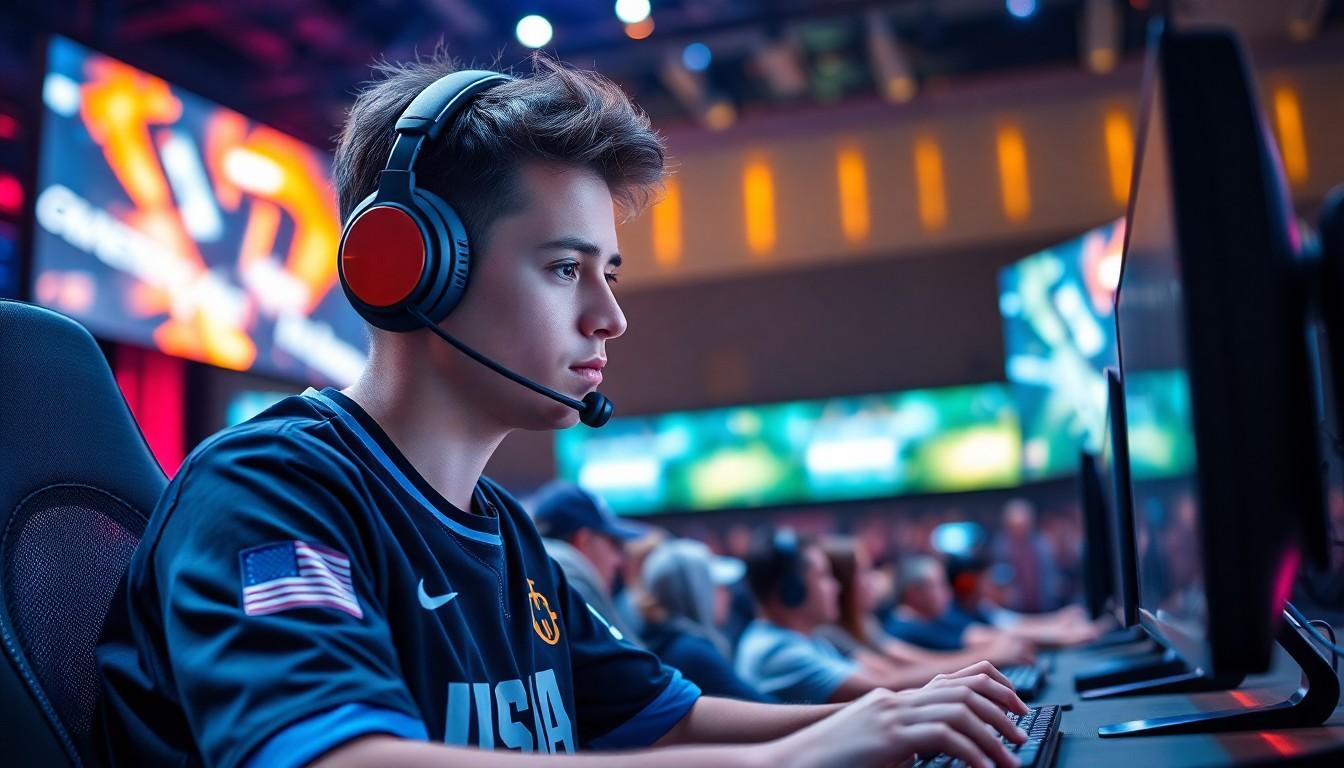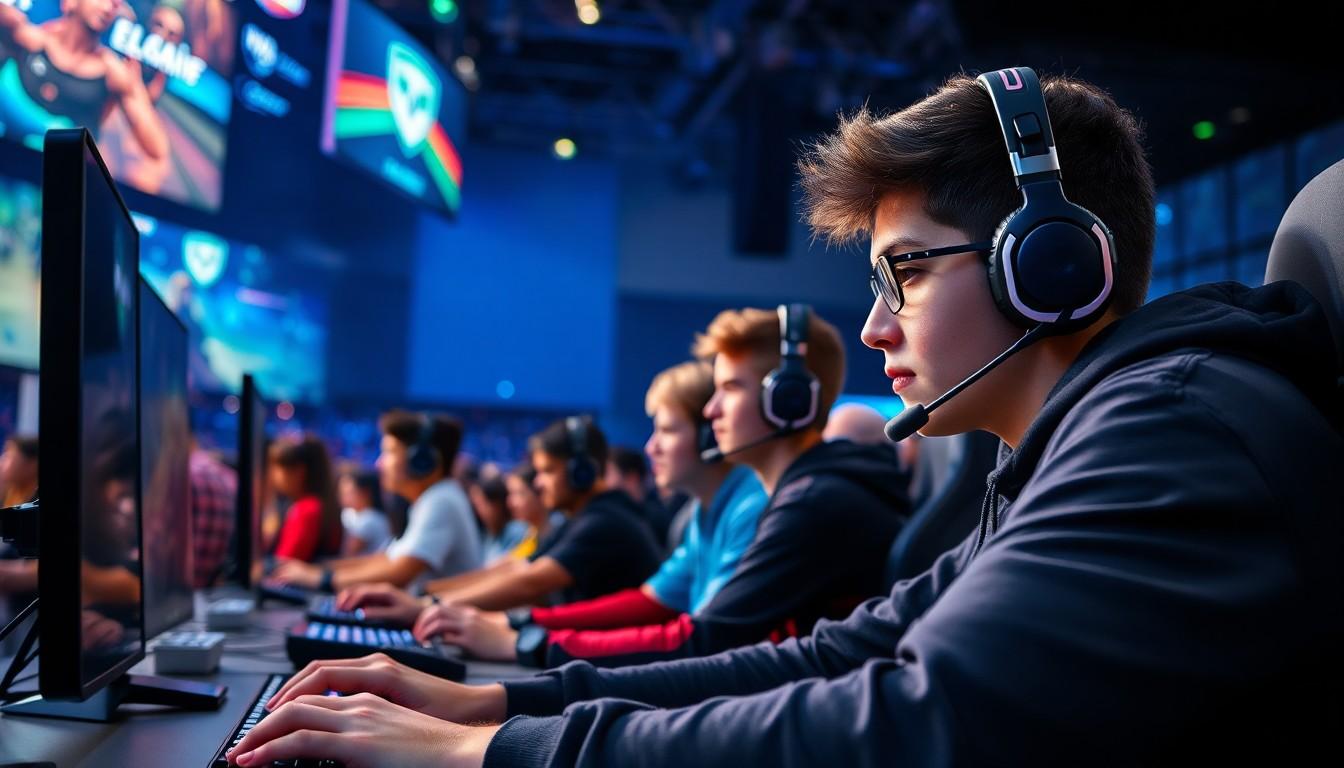
Why Should Esports Be Considered a Sport? Discover the Truth Behind Competitive Gaming
In a world where athletes are often defined by sweat and muscle, esports players are flipping the script from their comfy gaming chairs. Picture this: intense strategy, lightning-fast reflexes, and the same adrenaline rush you’d expect from a nail-biting final match. So why are we still debating whether esports should be classified as a sport?
Let’s face it, while traditional sports involve running around in jerseys, esports champions are racking up victories in their pajamas. They train just as hard, honing their skills for hours on end. With millions of fans and tournaments offering hefty prize pools, esports is not just a pastime; it’s a phenomenon. It’s time to embrace this digital arena and recognize that whether it’s on a field or a screen, competition is competition.
Definition of Esports
Esports, or electronic sports, represents competitive gaming where individuals or teams compete in various video games. This medium encompasses a wide range of genres, including multiplayer online battle arenas, first-person shooters, and real-time strategy games.
Brief Overview of Esports
Esports has rapidly gained popularity and recognition, evolving from casual play to organized competitions. Major tournaments attract thousands of spectators, both live and online. Events like The International and League of Legends Championship Series offer substantial prize pools, highlighting the significance of these competitions. Gamers often train rigorously, akin to traditional athletes, dedicating time to improving their skills.
Key Characteristics of Esports
Esports showcases several defining traits. Intense strategy plays a crucial role in gameplay, requiring players to analyze opponents and adapt tactics dynamically. Quick reflexes are vital; responding in milliseconds often determines the outcome of matches. Additionally, strong teamwork emerges as participants collaborate closely with teammates to secure victories. Engaging narratives and compelling storylines enrich the viewing experience, drawing in fans and creating a vibrant community.
Historical Perspective

Understanding the historical context of esports reveals its legitimacy as a sport. Insights into its evolution and milestones showcase significant developments over the years.
Evolution of Competitive Gaming
Competitive gaming began in the early 1970s, marking the start of a new entertainment medium. With the release of games like “Pong,” players discovered the thrill of competition. The 1980s and 1990s saw arcade tournaments growing in popularity, with titles like “Street Fighter” and “Super Mario Bros.” shaping early competitive landscapes. The advent of the internet in the late 1990s fueled global competition, allowing players to connect and compete from different locations. Online multiplayer games, such as “Quake” and “Counter-Strike,” laid the groundwork for the esports phenomenon. These developments highlighted both skill and strategy, attracting a diverse audience and setting the stage for organized esports events.
Milestones in Esports Development
Recognizable milestones mark the progression of esports into a mainstay of entertainment. The creation of the Electronic Sports World Cup in 2003 signified one of the first international tournaments. Major franchises began forming in the mid-2000s, including ESL and MLG, which institutionalized competitive gaming. By 2011, “League of Legends” championship events attracted millions of viewers online, showcasing the growing appeal of esports. The International, featuring “Dota 2,” introduced unprecedented prize pools, drawing attention from mainstream media. Furthermore, news outlets began regularly covering esports tournaments, demonstrating a shift in perception toward gaming as a legitimate competitive endeavor. Such milestones reflect esports’ transition into a recognized sport, connecting diverse audiences around the globe.
Physical and Mental Aspects
Esports encompasses both physical and mental elements, making it a compelling argument for recognition as a sport. Players exhibit skills that require extensive training and strategic thinking to succeed in competitive gaming.
Skill and Strategy in Esports
Mastering esports requires tactical acumen and quick decision-making. Players analyze opponents, assess game mechanics, and develop cohesive strategies. Each move impacts the outcome, showcasing deep mental engagement. Consider multiplayer online battle arenas, where teamwork and collaboration are critical. Titles like “League of Legends” and “Dota 2” demand exceptional coordination among team members. Top-tier competitors display remarkable adaptability, shifting strategies in real-time to navigate dynamic environments.
Physical Demands of Competitive Gaming
Esports demands physical endurance from players, similar to traditional sports. Long hours of gameplay impose resolute strain on the body and mind. Players often maintain rigorous training schedules that include hand-eye coordination exercises and reaction time drills. Maintaining optimal posture during extended sessions plays an essential role in injury prevention. Studies indicate that elite gamers endure physical fatigue akin to athletes in conventional sports. Stamina management influences performance levels during high-stakes matches. The combination of physical endurance and mental sharpness underscores the legitimacy of esports as a competitive sport.
Community and Culture
Esports boasts a robust community consisting of players, fans, and developers. This community thrives on shared interests, often gathering online and offline for events and tournaments. Gamers connect through forums and social media platforms, sharing strategies, experiences, and personal achievements.
The Esports Community
The esports community encompasses millions of players around the world. Various genres attract diverse gamer demographics, fostering inclusivity and engagement. Players often form teams, enhancing teamwork and camaraderie. Fans passionately support their favorite teams and players, creating an electrifying atmosphere during competitions. Events typically feature live streaming and commentary, enriching the viewing experience for spectators.
Cultural Impact of Esports
Esports significantly influences popular culture across the globe. Many traditional sports organizations recognize esports’ rising phenomenon, leading to investments and collaborations. Iconic brands sponsor events, tapping into the rapidly growing audience. Furthermore, esports fosters creativity, inspiring content creators and streamers who share entertaining gameplay and analysis. Events like TwitchCon highlight the convergence of gaming and culture, showcasing the passion that drives community involvement.
Comparison with Traditional Sports
Esports share various attributes with traditional sports. Both require impressive skill, extensive training, and strategic thinking. Competitors in each arena experience pressure during high-stakes moments, showcasing their ability to perform under stress. Community engagement thrives in both environments, with fans passionately supporting their favorite teams and players. Moreover, top esports events draw massive viewership, similar to popular traditional sporting events, generating significant media coverage and sponsorship deals.
Conversely, certain differences exist between esports and traditional sports. Players compete in virtual environments rather than physical arenas, which may impact perceptions of athleticism. While traditional athletes rely on physical prowess, esports athletes emphasize cognitive skills like decision-making and quick reflexes. Typical training regimens diverge too; esports participants often incorporate repetitive gameplay practice rather than physical conditioning exercises. Spectator experiences differ as well, with esports frequently emphasizing online streaming platforms over live attendance at arenas.
Legal and Institutional Recognition
Esports increasingly receives recognition from legal and institutional frameworks. This acknowledgment reflects growing acceptance within the sporting community.
Current Status of Esports in Sports Organizations
Various sports organizations, including the International Olympic Committee, explore the integration of esports into their activities. The Asian Games included esports as an official medal sport in 2018, marking a significant milestone in this recognition. Additionally, numerous traditional sports leagues, such as the NBA, invest in esports franchises. This shift demonstrates a merging of competitive gaming and established sports, validating the legitimacy of esports in the larger sporting context.
Future Prospects for Esports Recognition
Future prospects for esports recognition appear promising. As more countries adopt legal frameworks to regulate esports, the potential for formal acknowledgment escalates. Various educational institutions now offer scholarships and courses focused on esports, further legitimizing the discipline. Collaborations between esports organizations and traditional sports are increasingly common. This trend indicates a shift toward broader acceptance and recognition, enhancing the status of esports over time.
Conclusion
Esports stands at the intersection of competition and entertainment, showcasing skills that demand both mental acuity and physical endurance. As traditional sports begin to embrace this digital phenomenon, the lines between them continue to blur. The community surrounding esports thrives on passion and engagement, drawing in millions of fans worldwide.
With increasing recognition from established sports organizations and a growing infrastructure, esports is on a trajectory toward greater legitimacy. This evolution not only enhances its status but also paves the way for future opportunities. As esports continues to flourish, it’s clear that it deserves a place among the recognized sports of our time.
